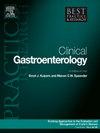Screening and surveillance of hereditary upper GI cancers
IF 3.2
3区 医学
Q2 GASTROENTEROLOGY & HEPATOLOGY
Best Practice & Research Clinical Gastroenterology
Pub Date : 2025-03-01
DOI:10.1016/j.bpg.2025.102018
引用次数: 0
Abstract
Upper GI cancer has poor prognosis. Of all upper GI malignancies, 1–3 % have a well-defined germline genetic cause. Hereditary upper GI cancers include squamous cell carcinoma as part of Tylosis, signet ring cell carcinoma of the stomach occurring in the context of hereditary diffuse gastric cancer syndrome, gastric adenocarcinoma affecting individuals with familial adenomatous polyposis syndrome (FAP), Gastric adenocarcinoma and proximal polyposis of the stomach (GAPPS), Lynch, Juvenile Polyposis and Peutz-Jeghers Syndromes, and duodenal adenocarcinoma, for which individuals with FAP and Lynch syndromes are at increased risk. This review will discuss the management of people with suspected or confirmed hereditary syndromes related to increased risk of upper GI cancers, with particular reference to indication for genetic testing, age of start of endoscopic screening, best practice in relation to endoscopic surveillance and indication for surgery.
遗传性上消化道肿瘤的筛查和监测
上消化道肿瘤预后较差。在所有上消化道恶性肿瘤中,1 - 3%有明确的生殖系遗传病因。遗传性上消化道癌症包括作为Tylosis一部分的鳞状细胞癌,发生在遗传性弥漫性胃癌综合征背景下的胃印戒细胞癌,发生在家族性腺瘤性息肉病综合征(FAP)个体的胃腺癌,胃腺癌和近端胃息肉病(GAPPS), Lynch,青少年息肉病和Peutz-Jeghers综合征,以及十二指肠腺癌。患有FAP和Lynch综合征的人患病风险更高。本综述将讨论与上消化道癌症风险增加相关的疑似或确诊遗传综合征患者的管理,特别涉及基因检测的适应症、开始内镜筛查的年龄、与内镜监测有关的最佳实践和手术适应症。
本文章由计算机程序翻译,如有差异,请以英文原文为准。
求助全文
约1分钟内获得全文
求助全文
来源期刊
CiteScore
5.50
自引率
0.00%
发文量
23
审稿时长
69 days
期刊介绍:
Each topic-based issue of Best Practice & Research Clinical Gastroenterology will provide a comprehensive review of current clinical practice and thinking within the specialty of gastroenterology.

 求助内容:
求助内容: 应助结果提醒方式:
应助结果提醒方式:


